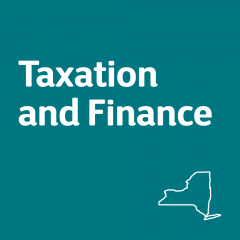About us
Mission
To efficiently collect tax revenues in support of State services and programs while acting with integrity and fairness in the administration of the tax laws of New York State.
Overview
The New York State Department of Taxation and Finance collects tax revenues that fund services and programs that benefit New Yorkers. In fiscal year 2024, we collected more than $147 billion in state and local taxes.
Our department administers 49 state and local taxes and fees, including $23 billion in local sales tax and more than $14 billion in local income tax. In regard to real property taxes, the department supports more than 1,000 local governments that, in 2024, administered more than $71 billion in local property taxes. To explore, search, download, and share data about the taxes we administer, see Tax data.
A key department focus is the balance of efforts to promote voluntary compliance—the cornerstone of the State’s system of taxation—with the duty to enforce New York’s tax laws. More than 96 percent of the taxes collected are remitted voluntarily by taxpayers. The remaining 4 percent is a result of the department’s enforcement programs—audit, collections, and criminal investigations.
- Tax department
- Personal tax legislation
- Publish forms, instructions and guidance
- Assist and educate taxpayers
- Capture return data and process payments
- Resolve errors and issue bills
- Resolve protests
- Audit
- Collection
- Litigation
- Criminal enforcement
- Taxpayer
- Learn about tax obligations
- Review information
- File returns and make payments
- Answer questions about filing errors
- Review bills and pay or protest
- Pay taxes found due after protest
- Undergo audit
- Collection defense
- Litigation defense
- Criminal enforcement defense
Other responsibilities
The department is also responsible for the administration of the State’s treasury. The Division of the Treasury receives and disburses State funds, and serves as a custodian of special funds. The division is also a joint custodian of State securities with the State Comptroller.
Through agreements with other State agencies, the department collects additional revenues on behalf of individuals and the State, as well as assisting with fraud detection. Examples of joint measures include enforcing the collection of delinquent child support payments and identifying fraud regarding public assistance and unemployment insurance benefits.





